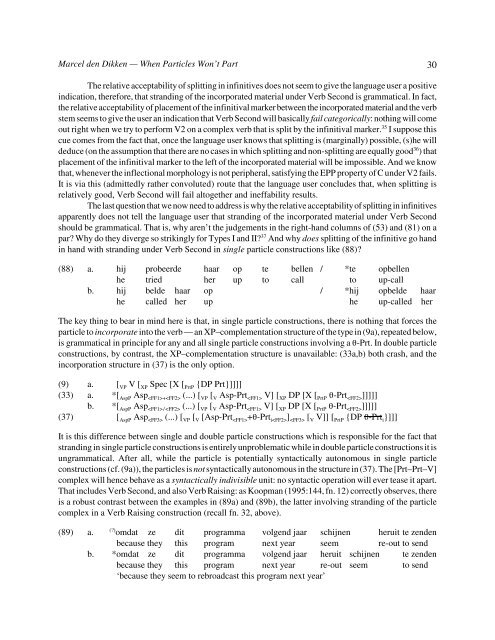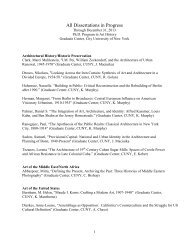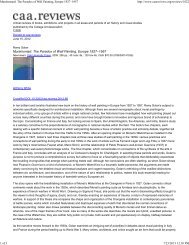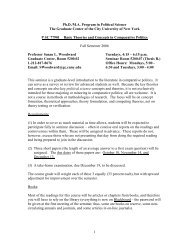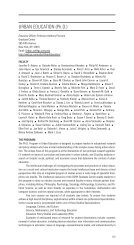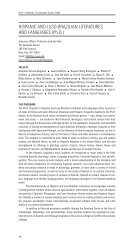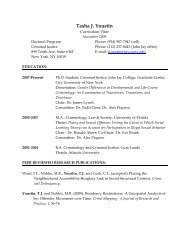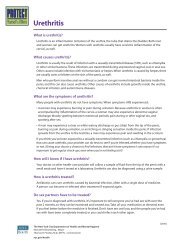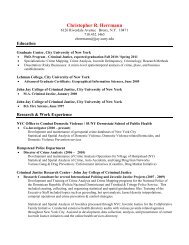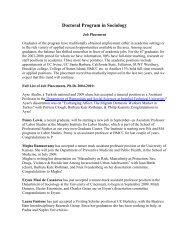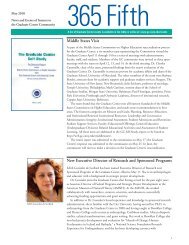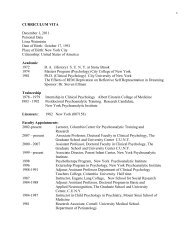When Particles Won't Part - CUNY Graduate Center
When Particles Won't Part - CUNY Graduate Center
When Particles Won't Part - CUNY Graduate Center
Create successful ePaper yourself
Turn your PDF publications into a flip-book with our unique Google optimized e-Paper software.
Marcel den Dikken — <strong>When</strong> <strong><strong>Part</strong>icles</strong> Won’t <strong>Part</strong><br />
The relative acceptability of splitting in infinitives does not seem to give the language user a positive<br />
indication, therefore, that stranding of the incorporated material under Verb Second is grammatical. In fact,<br />
the relative acceptability of placement of the infinitival marker between the incorporated material and the verb<br />
stem seems to give the user an indication that Verb Second will basically fail categorically: nothing will come<br />
out right when we try to perform V2 on a complex verb that is split by the infinitival marker. 35 I suppose this<br />
cue comes from the fact that, once the language user knows that splitting is (marginally) possible, (s)he will<br />
deduce (on the assumption that there are no cases in which splitting and non-splitting are equally good 36 ) that<br />
placement of the infinitival marker to the left of the incorporated material will be impossible. And we know<br />
that, whenever the inflectional morphology is not peripheral, satisfying the EPP property of C under V2 fails.<br />
It is via this (admittedly rather convoluted) route that the language user concludes that, when splitting is<br />
relatively good, Verb Second will fail altogether and ineffability results.<br />
The last question that we now need to address is why the relative acceptability of splitting in infinitives<br />
apparently does not tell the language user that stranding of the incorporated material under Verb Second<br />
should be grammatical. That is, why aren’ t the judgements in the right-hand columns of (53) and (81) on a<br />
par? Why do they diverge so strikingly for Types I and II? 37 And why does splitting of the infinitive go hand<br />
in hand with stranding under Verb Second in single particle constructions like (88)?<br />
(88) a. hij probeerde haar op te bellen / *te opbellen<br />
he tried her up to call to up-call<br />
b. hij belde haar op / *hij opbelde haar<br />
he called her up he up-called her<br />
The key thing to bear in mind here is that, in single particle constructions, there is nothing that forces the<br />
particle to incorporate into the verb — an XP–complementation structure of the type in (9a), repeated below,<br />
is grammatical in principle for any and all single particle constructions involving a 2-Prt. In double particle<br />
constructions, by contrast, the XP–complementation structure is unavailable: (33a,b) both crash, and the<br />
incorporation structure in (37) is the only option.<br />
(9) a. [ VP V [ XP Spec [X [ PrtP {DP Prt}]]]]<br />
(33) a. *[ AspP Asp + (...) [ VP [ V Asp-Prt V] [ XP DP [X [ PrtP 2-Prt ]]]]]<br />
b. *[ AspP Asp / (...) [ VP [ V Asp-Prt V] [ XP DP [X [ PrtP 2-Prt ]]]]]<br />
(37) [ AspP Asp (...) [ VP [ V [Asp-Prt +2-Prt i] [ V V]] [ PrtP {DP 2-Prt i}]]]<br />
It is this difference between single and double particle constructions which is responsible for the fact that<br />
stranding in single particle constructions is entirely unproblematic while in double particle constructions it is<br />
ungrammatical. After all, while the particle is potentially syntactically autonomous in single particle<br />
constructions (cf. (9a)), the particles is not syntactically autonomous in the structure in (37). The [Prt–Prt–V]<br />
complex will hence behave as a syntactically indivisible unit: no syntactic operation will ever tease it apart.<br />
That includes Verb Second, and also Verb Raising: as Koopman (1995:144, fn. 12) correctly observes, there<br />
is a robust contrast between the examples in (89a) and (89b), the latter involving stranding of the particle<br />
complex in a Verb Raising construction (recall fn. 32, above).<br />
(89) a. (?) omdat ze dit programma volgend jaar schijnen heruit te zenden<br />
because they this program next year seem re-out to send<br />
b. *omdat ze dit programma volgend jaar heruit schijnen te zenden<br />
because they this program next year re-out seem to send<br />
‘because they seem to rebroadcast this program next year’<br />
30


